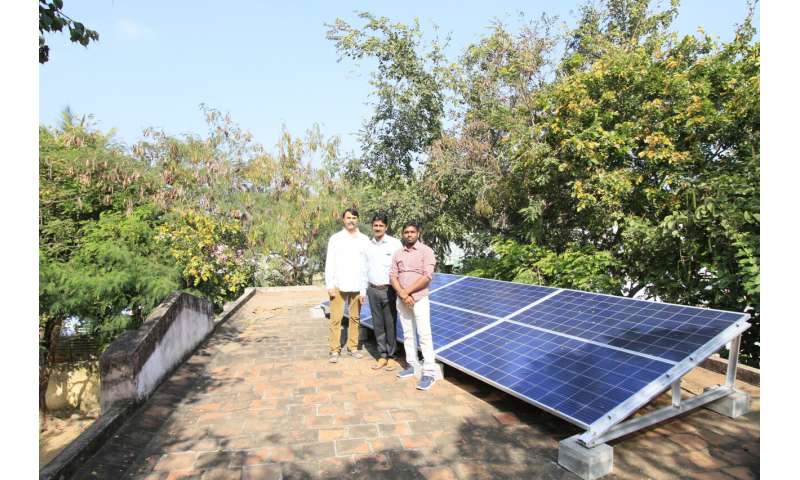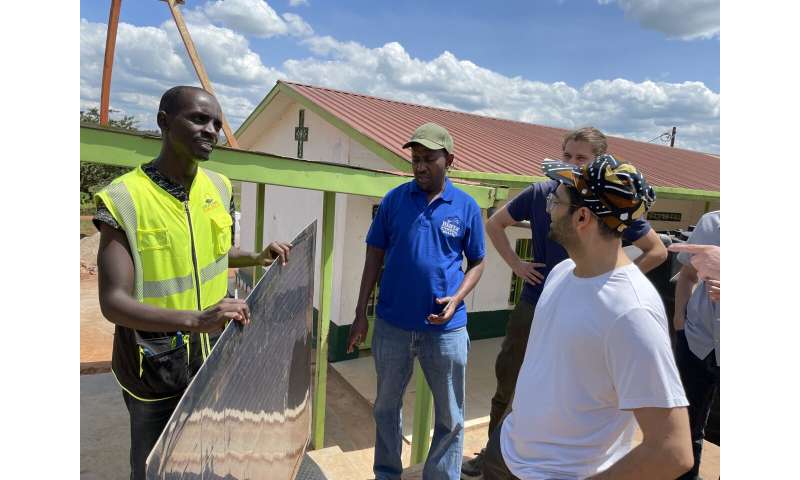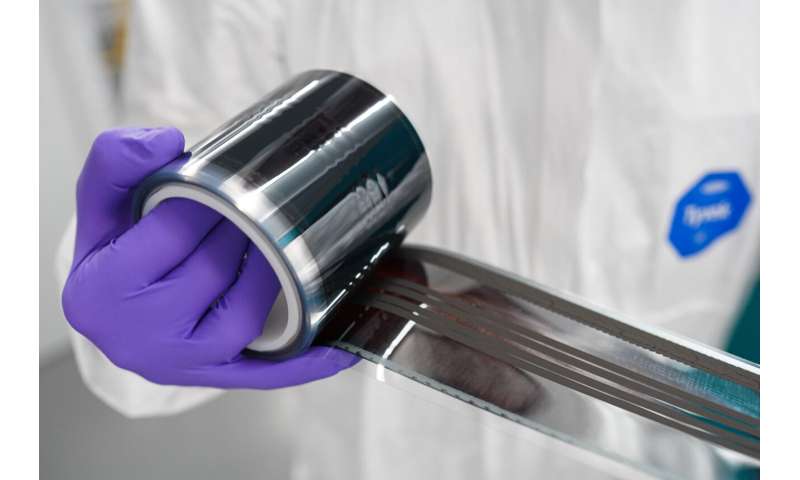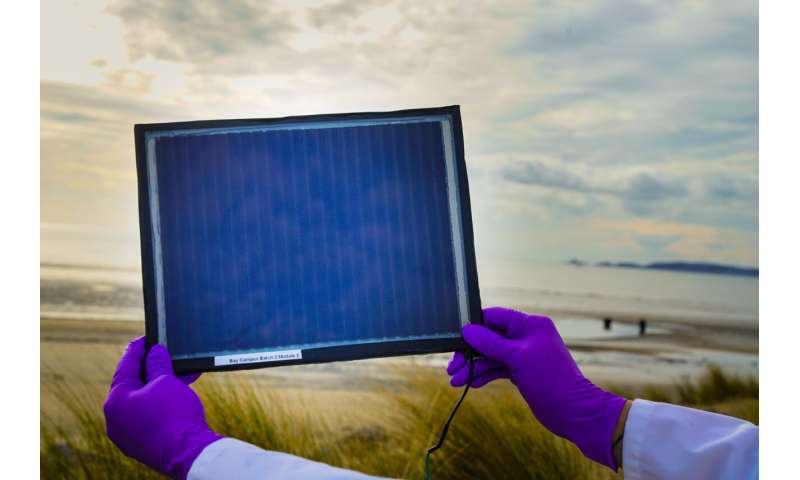New Collaboration to Support Sustainable, Locally Manufactured Solar PV in Africa, Asia and the Indo-Pacific region

A new collaboration led by Swansea University is seeking to support countries in Africa, Asia and the Indo-Pacific to increase the scale of local production of sustainable solar photovoltaics (PV).
Building on the University's SUNRISE network, the Transforming Energy Access (TEA) at SUNRISE project is a collaboration between universities and businesses across the UK, Africa, Asia, and the Indo-Pacific.
The project is part of the UK government-funded Transforming Energy Access (TEA) platform, which supports the technologies, business models and skills needed to create an inclusive clean energy transition.
TEA at SUNRISE aligns with the International Energy Agency (IEA) projection that 125 gigawatts of PV will be installed in Africa before 2030.
The project will build on the relationships established by SUNRISE, extending beyond Africa and India to identify the advantages of next-generation solar technologies across the Global South.
With abundant solar energy and large local markets, TEA at SUNRISE will explore the capability of countries in Africa, Asia and the Indo-Pacific to establish manufacturing hubs for efficient, low-cost PV modules.
Iain Meager, Director of Innovation at the Carbon Trust, said, "Collaboration is crucial to accelerating a just and inclusive clean energy transition. By joining forces with local stakeholders in Africa, Asia, and the Indo-Pacific, TEA at SUNRISE will bolster the knowledge exchange and learning necessary to accelerate the scale of sustainable photovoltaic manufacturing at a local level. This will not only help foster economic development but also reduce the environmental impact of PV production."
-

Honore Basazababo of Great Lakes Energy Ltd holding a non-glass silicon solar module. The module was being installed as part of an Innovate UK Energy Catalyst project with Solapak Development Ltd and Heifer International to improve energy access at a Milk Collection Centre in Kigali, Rwanda. Credit: Solapak Development Ltd -

An example of next-generation solar: fully roll-to-roll printed perovskite solar cell developed by SPECIFIC IKC at Swansea University. Credit: SPECIFIC Innovation and Knowledge Centre -

An example of next-generation solar: a fully printed perovskite module developed by SPECIFIC IKC at Swansea University. Credit: SPECIFIC Innovation and Knowledge Centre
While PV is one of the fastest-growing energy technologies worldwide, silicon PV, which currently dominates the market, has limitations.
The manufacturing process demands a substantial initial investment and extensive consumption of critical materials and energy. It also results in considerable waste when deployed at scale.
Moreover, silicon module manufacturing is not globally distributed and is associated with environmental, economic, and ethical issues tied to mining processes and the use of coal-generated electricity.
In response to these challenges, TEA at SUNRISE will place a strong emphasis on ensuring technologies are designed for a circular economy to limit waste and the use of critical materials.
Project lead Dr. Mark Spratt, from the SPECIFIC Innovation and Knowledge Centre at Swansea University, said, "TEA at SUNRISE builds on the highly successful SUNRISE network, extending the development of next-generation photovoltaics into Africa, Asia and the Indo-Pacific. In pursuing a just energy transition, these new technologies can play a pivotal role in ensuring energy access is delivered equitably, free of the environmental and ethical issues associated with current PV manufacturing."
This next generation of solar materials also offers a unique opportunity to design for ease of re-use and re-manufacture from the outset, with local manufacturing not only reducing logistics costs but also generating jobs and utilising lower-carbon sources of energy.
More information:
Transforming Energy Access (TEA)
TEA is the flagship Foreign, Commonwealth and Development Office (FCDO) research and innovation programme supporting early-stage testing and scale-up of innovative technologies and business models that accelerate access to affordable, clean energy for poor households, enterprises, and social institutions in developing countries across sub-Saharan Africa, South Asia, and the Indo-Pacific. This includes support to innovations across the three Ayrton Fund themes of clean supply, super-efficient demand and smart delivery, as well as integration of solutions across the three. In late 2021, a £126 million scale-up of the platform was announced at COP26, further advancing TEA into a major delivery platform for the Ayrton Fund focused on delivering innovations enabling a Just Transition for the 733 million people who still lack access to electricity and the 2.4 billion people who cook using fuels detrimental to their health and the environment.
When reporting this story, please use Swansea University hyperlinks.
Founded in 1920, Swansea University is a research-led, dual campus university located along Swansea Bay in south Wales, UK. Its stunning beachfront campuses and friendly welcome make Swansea University a desirable destination for more than 22,000 students from across the globe. There are three academic faculties, delivering around 450 undergraduate and 350 postgraduate degree programmes.
Swansea is a UK top 30 institution, ranked 25th in the 2024 Guardian University Guide. In the 2021 Research Excellence Framework, 86% of Swansea University's overall research and 91% of its research environment were classed as world-leading and internationally excellent, with 86% of its research impact rated outstanding and very considerable.
Swansea University is a registered charity. No. 1138342.
For more information, please contact Ffion White, Swansea University Press Office. Call 01792 602706, or email: f.e.white@swansea.ac.uk
Follow us on Twitter: www.twitter.com/SwanseaUni
Find us on Facebook: www.facebook.com/swanseauniversity
Provided by Swansea University